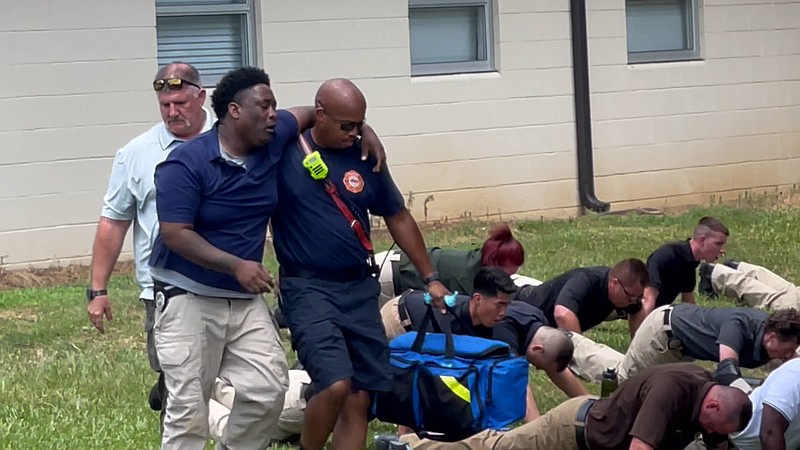The Arkansas Commission on Law Enforcement Standards and Training has completed an internal investigation into the death of Jonesboro officer Vincent Parks at its police academy in July and found no wrongdoing rising to a fireable offense, according to Director J.R. Hankins.
Parks died July 17 after participating in about 25 minutes of physical training at the facility, according to an Arkansas State Police investigation. Temperatures reached 97 degrees with a heat index of 106 in the region.
Original statements made by Arkansas Department of Public Safety officials said Parks did not participate in any physical activity before his death. It took nearly a month for state officials to amend their original statement.
Pulaski County Prosecutor Larry Jegley decided in December that no criminal charges would be filed in the case. He cited the medical examiner's report that ruled the cause of death an accident from three health conditions, including sickle cell disease, triggered by physical exertion and heat stress, hypertensive heart disease and obesity.
In a letter written to Col. Bill Bryant on Dec. 15 and released the next day, Jegley outlined his reasons for not pursuing charges.
"However, the file did contain concerning issues with the culture of the training program at ALETA," Jegley wrote. "Including Hazing and the lack of helpful cooperation in the investigation. We will not reiterate those concerns here, but would invite a careful inquiry into the practice, procedures, and other problems at ALETA made obvious in the ASP report."
Hankins did not provide further comment on the internal investigation but previously responded to Jegley's letter, calling it an "unfortunate commentary." He said the report on the investigation is not available to the public.
"The ALETA Basic Training Program is specifically designed to prepare officers for a successful career in law enforcement," he wrote. "The rigorous program includes simulated, real-world, scenarios that officers can expect to encounter during their career. ALETA has trained thousands of officers since its creation and does not, and has never, engaged in or condoned hazing in any form."
The internal investigation likely reviewed the actions of CLEST Supervisor Joe Dubois, who was in charge of the training activities on the day Parks died. Dubois also was named as the source for the original press release from former Arkansas State Police spokesman Bill Sadler that said Parks did not participate in physical training.
Jonesboro command also told an Arkansas State Police investigator that they felt uncomfortable with Dubois after they felt he was attempting to pressure the remaining Jonesboro officers to stay in the program following Parks' death, per the investigative file.
Hankins was appointed to the position in August, following the resignation of former director Jami Cook for health reasons. Cook's resignation was in the works for some time, officials say, but came in the midst of legislators' questioning Arkansas Department of Public Safety staff about Parks' death.
Arkansas Gov. Sarah Huckabee Sanders appointed Hot Springs Police Department Chief Chris Chapmond to take over the position starting next week.
"I have made it clear that under my leadership, our brave law enforcement officials will always have the training and resources they need to keep Arkansans safe – and I am proud to announce that Hot Springs Chief of Police Chris Chapmond will help me accomplish this as director of the Arkansas Commission on Law Enforcement Standards and Training," Sanders said in a news release.
Chapmond has been chief of the Hot Springs Police Department since 2020. He served as a police chief in Bluffton, S.C., from 2018 to 2020, and as assistant chief in Hot Springs prior to taking the Bluffton position.
Hankins previously said CLEST was in the process of creating a policy for training in extreme heat. The policy is expected to mirror one used by the military and the state's athletic association.
Officials also told Rep. Mark Berry, R-Ozark, that they will be drafting a hazing policy for the academy.
Berry sponsored a bill last week that would have made hazing at the academy a felony. He withdrew the policy after receiving reassurances about the policy.
A bill examining training in extreme heat is still expected to be filed this session.
